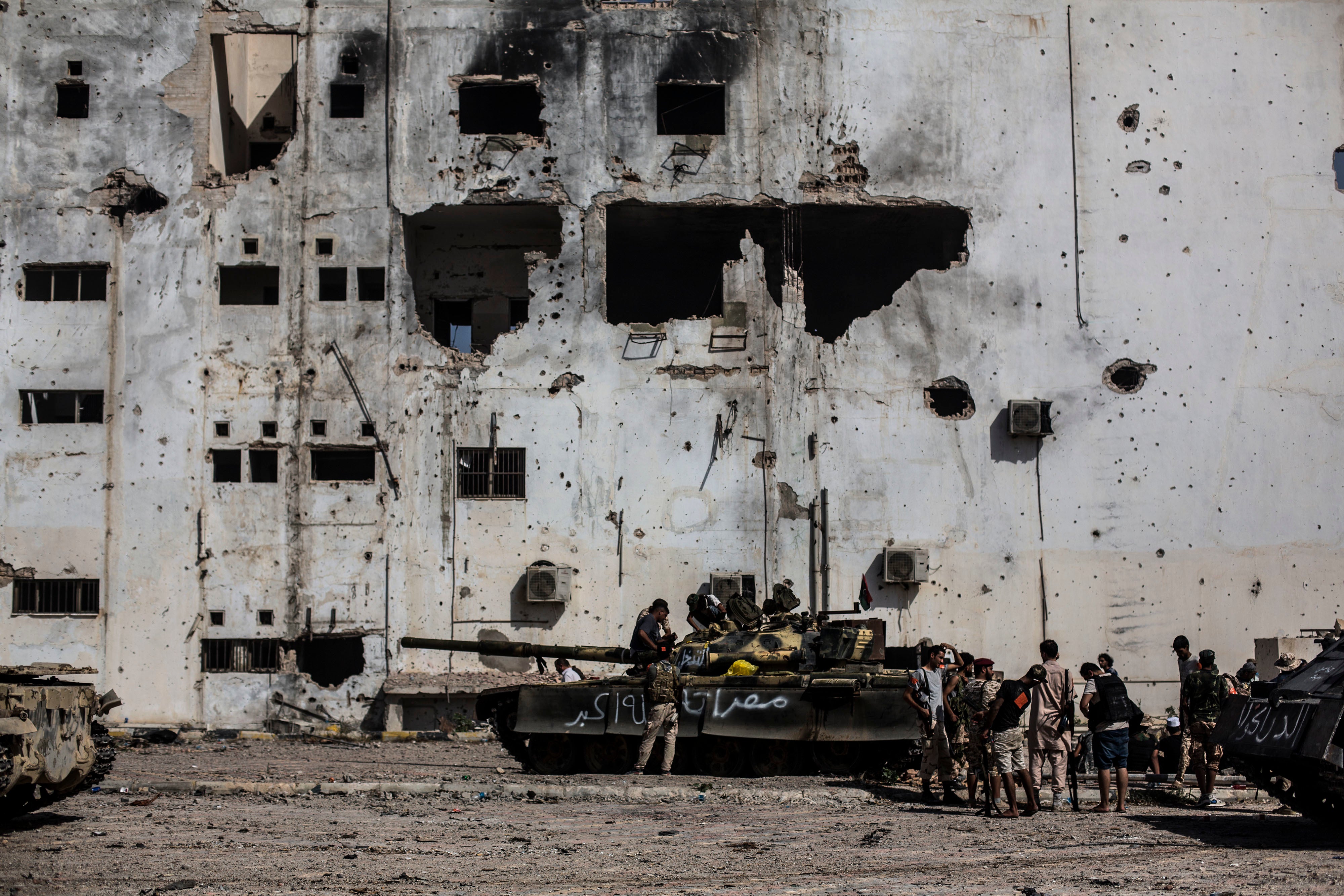Western nations have a responsibility to help Libya get back on its feet
There are a number of complicated issues that need dealing with, but the country’s citizens deserve a chance at something better, writes Borzou Daragahi


The recent gathering of world powers in Berlin aimed to discuss how to put a permanent end to the conflict in Libya, stitch the country’s fragmented patchwork of security and governance back together, and put the oil-rich country on a path toward stability.
The United States, United Kingdom, France, China, Russia, Italy, Turkey and the United Arab Emirates were among those who sent envoys to the second Berlin conference on Libya in 18 months. They were joined this time by Libya’s newly formed and internationally recognised Government of National Unity, led by the prime minister, Hamid Dbeibah.
His caretaker team, which became Libya’s official authority in March, is overseeing the country’s affairs until national elections in December that are meant to empower a new government with a popular mandate.
So far, so good. But between now and the elections, and even beyond, several obstacles lie on Libya’s road to normality after 10 years of chaos and war that followed the Nato-backed overthrow of Muammar Gaddafi’s regime.
The first and biggest challenge is subduing the ambitions of Khalifa Haftar, who conquered much of eastern Libya before he was thwarted in his efforts to seize control of the capital, Tripoli. Haftar fashions himself as an Arab autocrat in the mould of Egypt’s Abdel Fattah el-Sisi and has broken multiple agreements in his quest for power. Yet world leaders are convinced he’s an essential component to any solution in Libya.
“He always demands more and will never stop,” says Jalel Harchaoui, a senior fellow at the Global Initiative Against Transnational Organised Crime. “From the moment you decide to include Haftar in any solution because you don’t want him to tumble down, you end up with huge consequences politically, economically and militarily.”
Another major challenge is Turkey. It has agreed to withdraw the thousands of mostly Syrian mercenaries it deployed in its effort to help the government of Tripoli fend off Haftar. Withdrawing such outside forces – including Russian Wagner soldiers of fortune that the Pentagon has suggested are bankrolled by the United Arab Emirates (a claim denied by the UAE) to support Haftar – was a major focus of the Berlin talks. More challenging will be to convince Turkey to withdraw the uniformed regular forces it has positioned at the highly strategic al-Watiyah airbase south of Tripoli, and elsewhere.
Russia, too, has control over bases in the north African country. Geopolitical rivalries are a major driver of the conflict in Libya, and it will be tough to convince Ankara or Moscow to give up such prizes.
“Nobody is going to give up anything,” says Harchaoui. “It means effectively that the reality will remain messy, even if the situation looks calm.”
Working in Libya’s favour is the constructive engagement of the United States under Joe Biden. It was his predecessor, Donald Trump, who handed the UAE a blank cheque to do whatever they wanted in Libya and elsewhere, and who gave Haftar a wink and a nod ahead of his ultimately disastrous campaign to take the capital.
In contrast, the Biden team – building on a strategy developed by professional diplomats in the final months of the Trump administration – has had tough but discreet talks with counterparts in both Ankara and Abu Dhabi, urging restraint.
“The Biden administration has decided to undertake diplomacy in a very quiet way,” said Joey Hood, a top US State Department official, in a briefing with journalists on Thursday. “Through our quiet diplomacy, we absolutely are having very, very in-depth and pointed conversations with our allies such as the UAE and Turkey on issues related to Libya and other files.”
Libya’s decade-long plunge from erratic one-man dictatorship into a chaotic failed state has had wide-reaching consequences. The evolving conflicts in Libya have already cost many lives and caused much damage to the country.
An estimated 1.3 million people in Libya require international aid, 400,000 more than in 2020, according to the United Nations. Still only 20 per cent of a $189m humanitarian response plan has been funded by the international community.
Libya’s disarray also contributes to the refugee and migrant crisis in southern Europe, with Libyans and those from the rest of Africa driven to take the dangerous trip by boat across the Mediterranean.
“Stabilising Libya means stopping irregular migration and reducing the risk of terrorism,” the Italian foreign minister, Luigi di Maio, said this week. “Doing so is crucial for Italy and Europe’s security.”
Hood noted it was instability in Libya that ultimately sparked Chad’s armed conflict, which led to the death of the country’s longtime ruler, Idriss Deby. “We saw in Chad last month just exactly how profound that instability can be on neighbouring countries,” said Hood.
Years earlier, the conflict in Libya had also contributed to the destabilisation of Mali, which continues to be roiled by several armed insurgencies.
It’s important to get Libya right, and given the west’s role in toppling Gaddafi and seriously botching the aftermath, it has an outsized responsibility in helping the country get back on a track towards being a place where ordinary labourers, civil servants, schoolchildren and merchants can live their lives with some sense of normality.
Join our commenting forum
Join thought-provoking conversations, follow other Independent readers and see their replies
0Comments